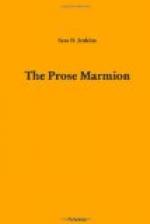First on prancing steeds came the trumpeters,
“With scarlet mantle,
azure vest;
Each at his trump a
banner wore,
Which Scotland’s
royal scutcheon bore:
Heralds and pursuivants,
by name
Bute, Islay, Marchmount,
Rothsay, came,
In painted tabards,
proudly showing
Gules argent, or, and
azure glowing,
Attendant
on a king-at-arms,
Whose hand the armorial
truncheon held,
That feudal strife had
often quelled,
When wildest
its alarms.”
The king-at-arms was of grave, wise, and manly appearance, as became him who bore a king’s welcome, but his expression was keen, sly, and penetrating.
“On milk-white palfrey
forth he paced;
His cap of maintenance
was graced
With the
proud heron-plume.
From his steed’s
shoulder, loin, and breast,
Silk housings
swept the ground,
With Scotland’s
arms, device, and crest,
Embroidered
round and round.
The double treasure
might you see,
First by
Achaius borne,
The thistle and the
fleur-de-lis,
And gallant
unicorn.
So bright the King’s
amorial coat,
That scarce the dazzled
eye could note.
In living colors, blazoned
brave,
The Lion, which his
title gave;
A train, which well
beseemed his state,
But all unarmed, around
him wait.
Sir David
Lindesay of the Mount,
Lord Lion,
King-at-arms!”
Marmion sprang from his horse, and as soon as their mutual greetings had been made, Sir David delivered his message:
“As King-at-arms, I have been sent by James’s command to meet you, Lord Marmion, and to provide fit lodging, until the King himself shall find time to see the famed, the honored Lord of Fontenaye, the flower of English chivalry.”
Though angry at this reception, Marmion disguised his feelings. The Palmer, seeing his place as guide taken by the King’s messenger, begged to be permitted to leave the service. But orders had been strictly given that no one following Marmion should be permitted to separate from the English band. They therefore set forth together and at length halted before a noble castle on the side of the valley of the Tyne. It was Crichtoun Hall, near the city of Edinburgh, and was a lodging meet for one of highest rank. Tower after tower rose to view, each built in a different age and each displaying a different style of architecture.
“A mighty mass that
could oppose,
When deadliest hatred
fired its foes.”
Through the gate rode the English ambassador, but met by none of the rank and file usual on such occasions. Only women, old men, and children occupied the castle. The sorrowing mistress of the hall gave welcome, and a stripling of twelve years offered his best service. Every man that could draw a sword had marched that morning to conquer or to die on Flodden Field. Long would the lady look in vain to see her husband and his gallant band return.




